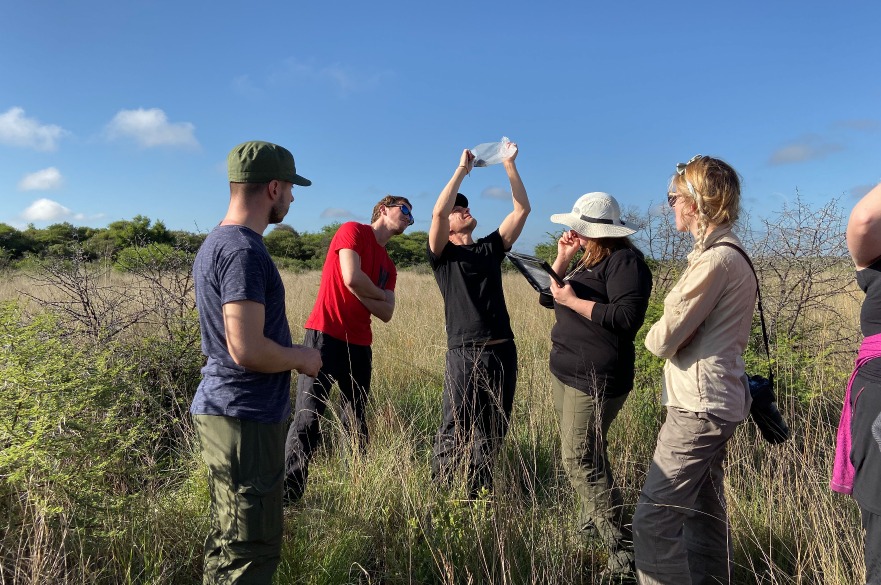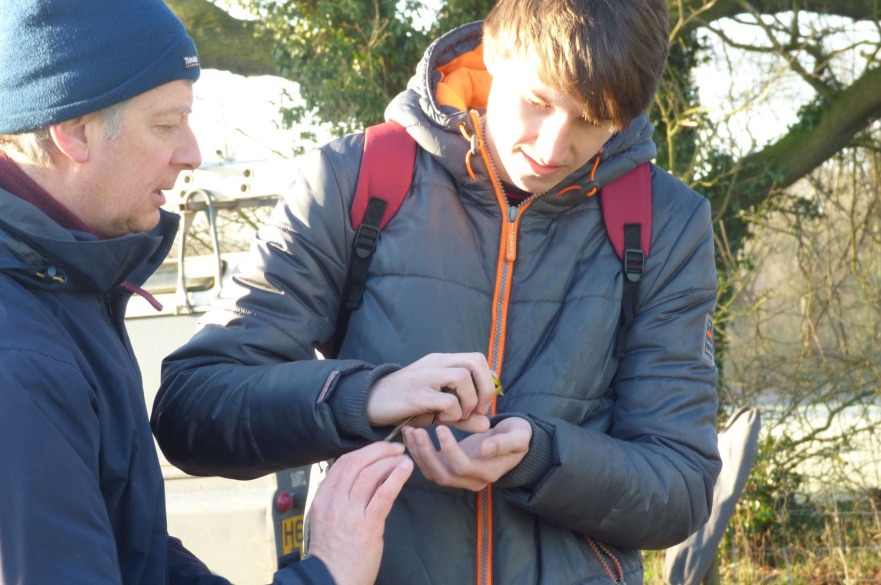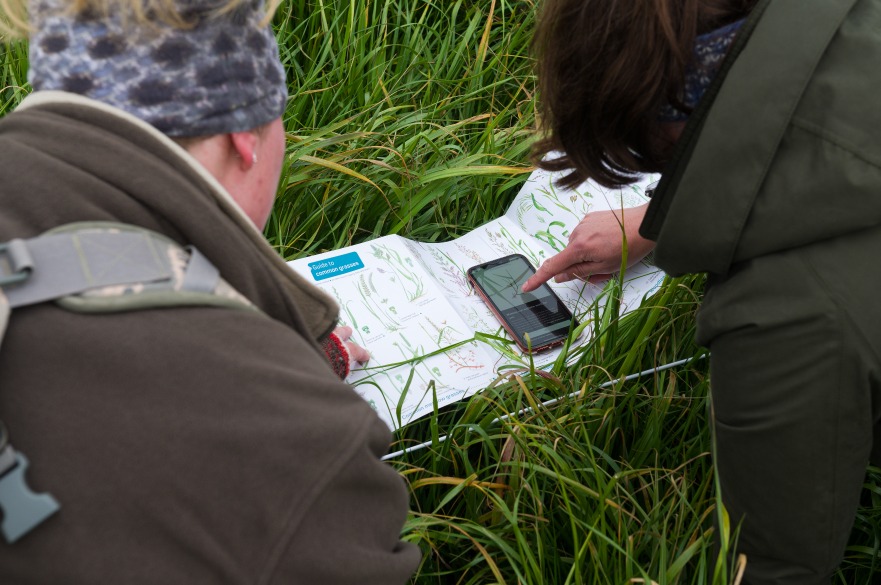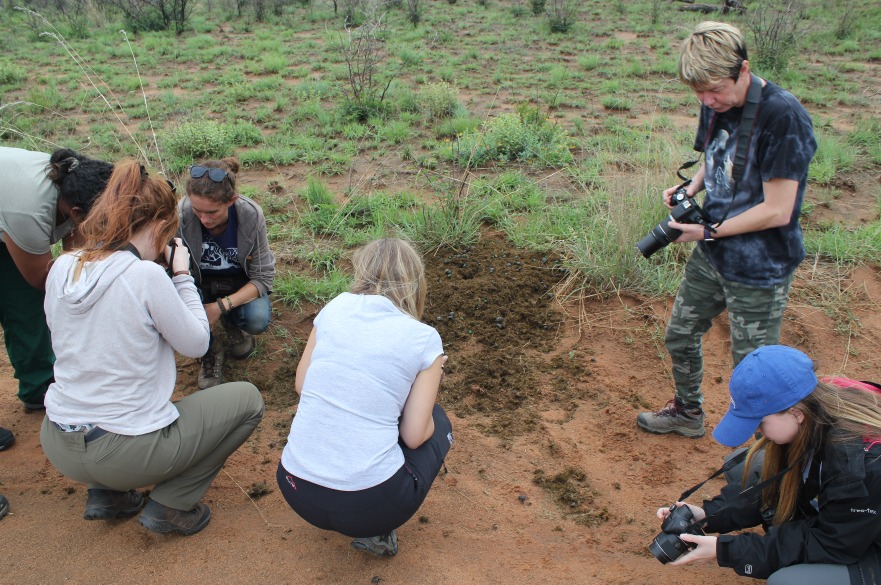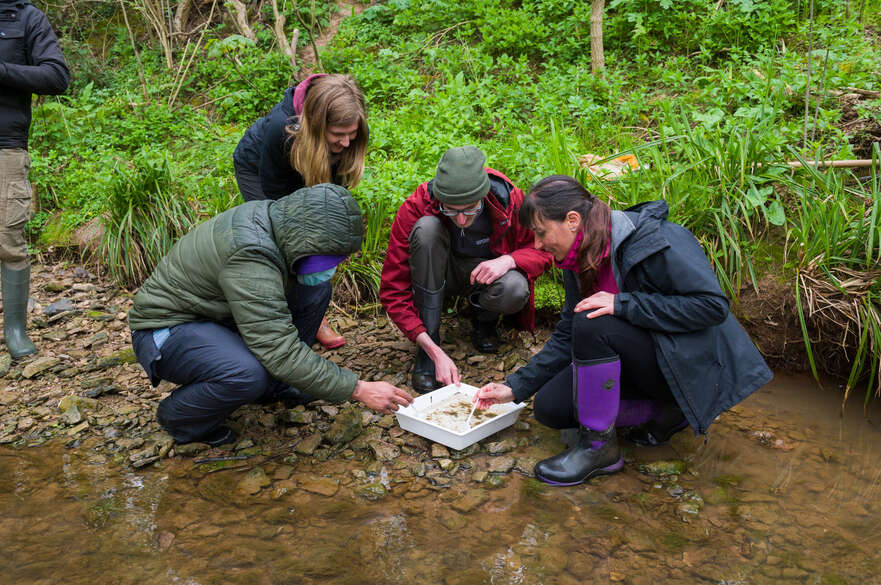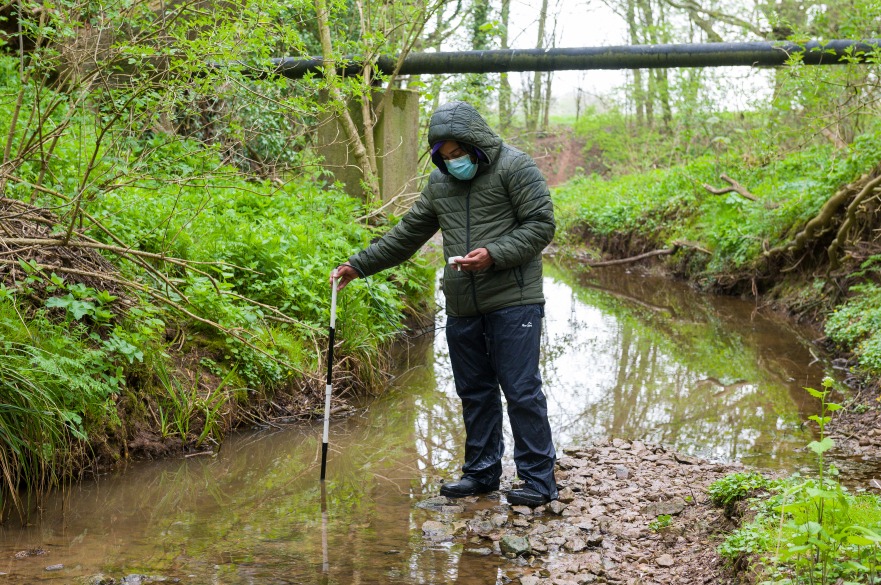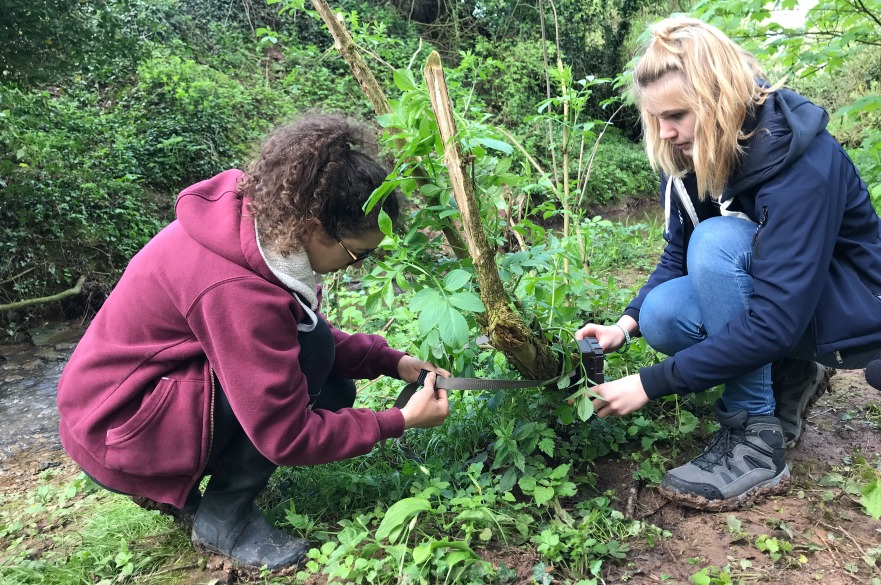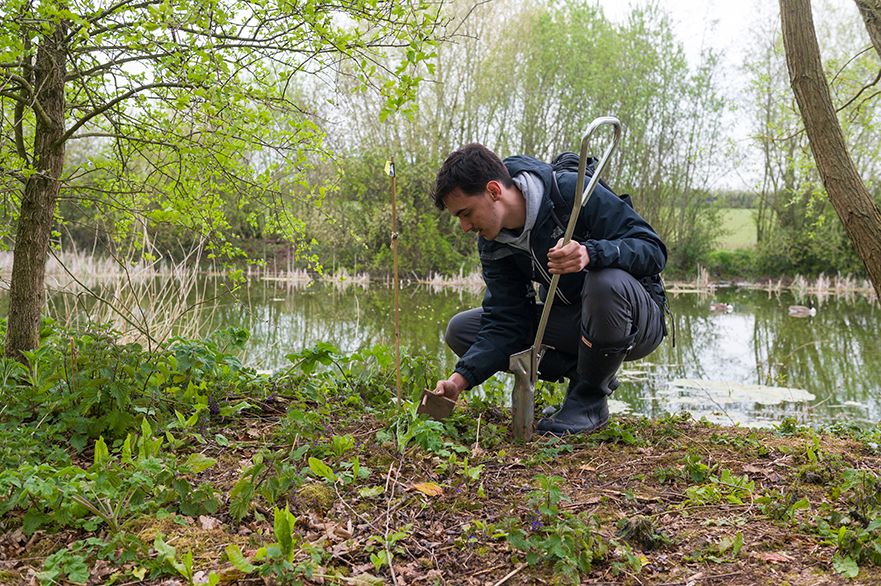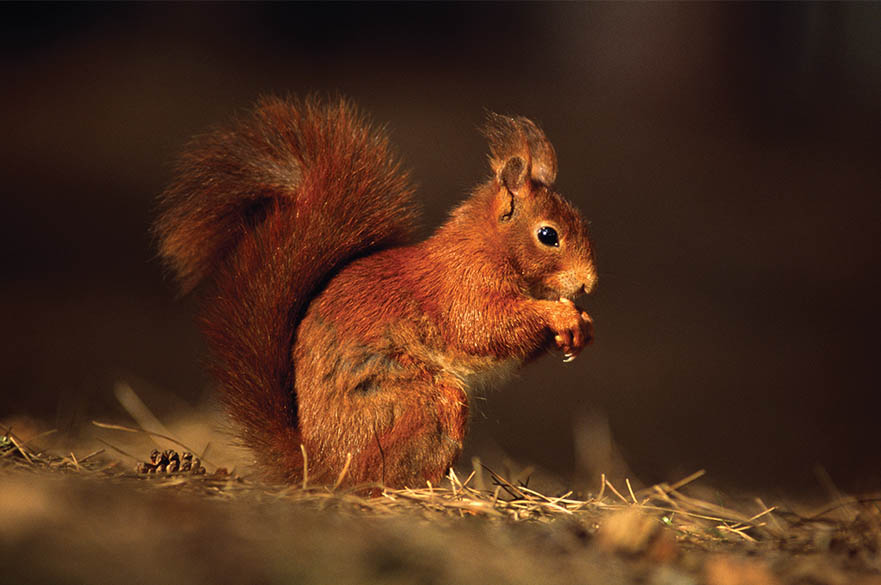About this course
This course is an integrated foundation degree, where you'll progress onto our BSc (Hons) Ecology and Conservation course, once you successfully complete your foundation year.
Our integrated foundation degrees offer a unique gateway to our BSc courses for those who currently don't meet the degree-level entry criteria. The foundation year acts as a launch pad, supporting you with the transition to university learning. Anticipate a year filled with the development of robust study skills, increased confidence in tackling intricate problems, and the cultivation of independent learning. Rest assured, by the end of this transformative year, you'll emerge well-prepared for the exhilarating challenges that await you at degree level.
About the BSc course
The world faces unprecedented environmental challenges, which threaten the future of plants, animals and people. You'll focus on ecological concepts, the natural world, and how we conserve it, through exploring community and ecosystem ecology of habitats, plants and the people who use them.
This course will help you explore practical solutions to these problems, through a range of lectures, practicals and fieldwork, preparing you for a career in ecology and conservation.
Our 200-hectare rural campus offers a unique learning environment where you will put theory into practice and gain hands-on ecology and conservation experience. We utilise this outdoor classroom in many of our modules, for example, by undertaking species and habitat surveys across the campus. You will be taught by lecturers that have vast experience in the conservation sector and in ecological research.
Throughout the course, you will have the chance to participate in exciting field courses. Previous examples of trips include South Africa, southern Spain and Pembrokeshire, looking at the unique biodiversity of savannah, Mediterranean and coastal ecosystems, respectively. You will also experience a range of non-residential field trips to various local and national sites of importance to nature.
You will have the opportunity to undertake a year-long industry sandwich placement in the conservation sector between your second and final year, providing an excellent opportunity to explore an aspect of ecology or conservation that interests you while increasing your employability prospects.
If you have any questions about the BSc (Hons) Ecology and Conservation course, you can contact the course leader Dr Adam Bates.
-
91% of BSc (Hons) Ecology and Conservation (full-time) students are positive about the academic support on their course (National Student Survey 2024).
-
There is currently a residential field course in the final year. Previous locations have included Pembrokeshire in the UK and South Africa (Mankwe Wildlife Reserve), studying coastal management and the effect of savannah burning on large mammal diversity, respectively.
-
You'll get the chance to volunteer with extra projects, such as surveying great crested newts, ringing birds and trapping small mammals on campus.
-
94% of our BSc (Hons) Ecology and Conservation graduates are in work or further study within 15 months of finishing their degrees (of those available for work or study, latest Graduate Outcomes Survey 2021/22).
Which course is right for you?
We offer two conservation degrees, each with a different focus:
- BSc (Hons) Ecology and Conservation / BSc (Hons) Ecology and Conservation (with foundation year) (this course) - explores community and ecosystem ecology (i.e. larger scale ecology) and has more of a focus on habitats, plants, land use and the habitat requirements of species.
- BSc (Hons) Wildlife Conservation / BSc (Hons) Wildlife Conservation (with foundation year) - explores behavioural and population ecology (i.e. smaller scale ecology) and has more of a focus on wild animal species and animal conservation management, both in the UK and overseas.
What you’ll study
The course has been designed to develop your knowledge and understanding of both natural and human-made environments. We work closely with employers to ensure that we teach key transferable and industry-specific knowledge and skill sets.
You will study the ecology of plants, animals and land use, the conservation of organisms and the management of habitats. You will examine environmental impact assessment and global food security issues. You will learn highly-valued ecology and conservation skills like species identification, environmental law, and the application of Geographical Information Systems (GIS). You will develop an understanding of the social and economic issues which underpin pressing environmental problems. You will also have the chance to tailor your studies, by choosing optional modules to focus on your particular area of interest in the final year.
Each year of your degree course consists of 120 credits spread over at least five modules (see below), including optional modules in your final year. During your final year, you will also have the opportunity to conduct independent dissertation research on a topic of your interest with the one-to-one support of our lecturers.
Your lectures will cover topics such as:
- Animal ecology
- Plant ecology
- Habitat management
- Environmental monitoring
- Ecological consultancy
This is your foundation year. You'll study five modules and there's a detailed breakdown of what's included in each below.
Foundation Biology (20 credits)
Study fundamental biological concepts across various areas. You'll explore topics including the characteristics of living organisms, classification and taxonomy, cell structure, microbiology, genetics, and biological systems.
Laboratory Skills (20 credits)
Gain essential laboratory skills for biological and environmental sciences. Emphasizing good laboratory practice, health and safety, and key techniques like weighing, dilution, titration, and microscopy, you'll develop proficiency in recording, evaluating, and presenting laboratory findings.
Science in Practice (20 credits)
Learn cross-disciplinary scientific application skills. Utilizing case studies, you'll explore how scientific principles address real-world problems in various sectors. Topics encompass sustainability, including the identification of the 17 Sustainable Development Goals (SDGs), data presentation and interpretation, and positive actions to mitigate human impact on ecosystems.
Field Skills (20 credits)
Gain technical and practical field skills. Through practical classes on the campus estate and at other locations, you'll explore fieldwork safety and risk assessment, as well as key techniques like map reading, plant and animal identification, and environmental analysis. Additionally, you'll also look at data collection in the field and report writing for fieldwork.
Preparing for Success (40 credits)
Explore your personal values and look at the human, social and emotional aspects of professional learning to support your transition to studying at degree-level. Via problem-based and experiential learning, you'll explore note-taking, Virtual Learning Environment usage, time management, assessment interpretation, exam techniques, professional communication, scientific write-ups, citation and referencing, and presentation skills.
From Year Two onwards, you'll study the modules of the degree course.
Principles of Ecology (20 credits)
Examine the interactions between organisms and their environment, at individual, population, community and ecosystem levels. Investigate the abiotic (non-living) and biotic (living) factors driving population and community dynamics through a series of lectures and practical sessions undertaken on the Brackenhurst Campus.
Introduction to Plant Ecology (20 credits)
Delve into the fascinating world of plant ecology, learning about their essential role in the creation and maintenance of the biosphere on which life depends. Examine the adaptations of plants to their environment and how these shape plant assemblage classification. Practical sessions include looking at the remarkable adaptations of real plants and creating a herbarium.
Biodiversity Conservation (20 credits)
Explore the amazing array of biological diversity on Earth, focusing on the abundance and distribution of species. Investigate theories addressing evolution, the causes of mass extinctions, and the conservation of species through a series of lectures and practical sessions including owl pellet dissections.
Ecological Census Techniques (20 credits)
Study how to identify plants and animals, and plan and conduct field surveys to monitor species and habitats. You will learn about the principles of surveying techniques before conducting your own field-based surveys across Brackenhurst Campus, including camera trapping, small mammal surveys, breeding bird surveys, and Phase 1 habitat surveys. These field skills are crucial for roles across the conservation sector.
Animal Structure, Function and Adaptation (20 credits)
Explore animal anatomy and physiology across a range of species. You'll delve into cellular biology, genetic processes, survival strategies and how animals adapt to environmental challenges in various ecosystems.
Practical Conservation Skills (20 credits)
Working on either the Brackenhurst Estate or on sites managed by external organisations, you will participate in a range of practical habitat management activities such as coppicing ancient woodland or managing grasslands, and identify how these management techniques can improve conditions for nature. You will develop confidence in the use of a range of tools and gain insight into creating a safe working environment.
Applied Habitat Management (20 credits)
Understand the ecology and habitat management of a range of the most important UK habitats via site-based evaluations. You will also learn how to create a conservation management plan, which is a key skill required when working in the conservation sector.
Land Use Ecology (20 credits)
Explore land uses such as forestry and farming and investigate how ecological processes shape them. Understand the influence of ecological processes on the products of the land use and learn how humans impact the ecological processes.
Introduction to Research (20 credits)
Explore the principles of research methods in biological sciences, focusing on data collection, analysis, and interpretation. You'll look at experimental design, literature evaluation and hypothesis testing, preparing you for undertaking independent research as part of your final year dissertation.
Environmental Monitoring and Geographical Information Systems (GIS) (20 credits)
Get hands-on practical experience in environmental monitoring techniques and use geographical information systems (GIS) software to map and analyse data that you have collected in the field.
Law and Policy (20 credits)
You will be introduced to the past, present and future laws and policies relating to the environment, wildlife and conservation. You will look at a range of specific wildlife and environmental laws, the reasons that we need them, the ways in which they work, and, finally, evaluate whether they are working to protect nature and natural resources.
Technical Skills (20 credits)
Understand the skills needed to plan and carry out field investigations and why these skills are valued by employers. Practice planning field investigations, collecting data and understanding and presenting results during an overseas residential field course.
This is a placement year for students on the sandwich course.
Dissertation (40 credits)
Undertake an independent research project under the supervision of our experienced staff. Focus on an area of conservation that interests you and allows you to use your practical and/or research skills to help you shape the focus of your degree.
Ecosystem Ecology (20 credits)
Learn the way ecological theory can be applied to practical conservation problems in the real world. Integrate learning with an understanding of economic and social considerations, to assess the magnitude of conservation challenges and identify solutions at an ecosystem scale.
Introduction to Ecological Consultancy (20 credits)
Gain the knowledge and skills required to secure a job in consultancy by looking at Ecological Impact Assessments, including the effects of new and existing developments on species and habitats. We will explore mitigation measures to reduce significant harm, as well as the importance of effective communication with stakeholders.
You'll also choose two optional modules, one of which must be a field course
Africa Field Course (20 credits)
Investigate the function and conservation of African ecosystems. Previously, this module has included a residential field course to Mankwe Wildlife Reserve, South Africa. The trip included undertaking wildlife surveys of a range of birds and mammals such as weaver birds, giraffes and rhinos, to estimate population size and understand how the environment influences species distributions.
UK Field Course (20 credits)
Investigate the ecology of coastal ecosystems. Previously, this module has included a residential field course to Pembrokeshire. The trip included using a variety of appropriate ecological methods, including rocky shore surveys and crab population studies.
Global Agriculture and Food Security (20 credits)
This module provides an overview of the global agricultural industry and investigates the concepts of production and sustainability in agriculture, forestry and fisheries. You will also experience site visits to gain an understanding of current practices and issues.
Marine and Freshwater Ecology (20 credits)
Understand the structure and function of different aquatic habitats, particularly the organisms that inhabit them and their ecological interactions. Apply these principles during a one-day UK field trip, and subsequent laboratory work, to investigate the impact of pollution on the freshwater macroinvertebrate community, as a bioindicator of ecological quality.
We regularly review and update our course content based on student and employer feedback, ensuring that all of our courses remain current and relevant. This may result in changes to module content or module availability in future years.
Don’t just take our word for it, hear from our students themselves
"Such an amazing and interesting course learning topics you wouldn't even think of when studying animals. 100% recommend to anyone interested in a career with animals."
(BSc (Hons) Zoology student review, Uni Compare)
Student Work
Video Gallery
How you're taught
You will be taught through a variety of methods including group seminars, lectures and practical sessions. Our conservation courses have a strong emphasis on practical learning and include field trips with opportunities in both the UK and abroad. There is also the option of an international exchange where you will study abroad for part of the course.
A placement year may be taken between year 3 and year 4 of study.
Please note that field trip locations may vary and are subject to availability and change.
Careers and employability
Your future career
We pride ourselves on having an excellent track record of graduate prospects. Our course is designed to set you up ready for the workplace, giving you industry-ready skills (e.g. specific field-based and IT software skills) and transferable skills (e.g. critical thinking, professional writing and problem-solving), enabling you to work in the diverse field of ecology and conservation.
You will also be provided with the opportunity to talk to potential employees through work-like experience, which is embedded into the degree programme, and via a showcase at the end of your final year, which gives you the chance to demonstrate your skills to potential future employers.
This course will enable you to progress in the ecology and conservation industries. Our graduates have gone on to work for bodies such as ecological consultancies, the National Trust, the Wildlife Trusts, FrogLife, and local government and statutory agencies.
94% of our BSc (Hons) Ecology and Conservation graduates are in work or further study within 15 months of finishing their degrees
(of those available for work or study, latest Graduate Outcomes Survey 2021/22).
Some of our students also go on to further study. Our Employability team at Brackenhurst Campus are dedicated to helping you find and apply for suitable jobs during and after your studies.
Industry sandwich placement opportunities
During the course you will have the option to do a year's placement in industry. The vital experience you will gain in a vocational position will make you more employable when you graduate.
Sandwich placements take place between Year Three and your final year. This is an excellent chance for you to explore an aspect of ecology or conservation that interests you as a career while significantly improving your employment prospects.
Placements can be undertaken with one or several organisations, either in the UK or abroad. A placement diploma is available for students who have undertaken a substantial placement of at least 36 weeks. A placement certificate is available for students who have undertaken a shorter placement of at least 6 weeks. Our Employability team can help you to secure your placement.
Students have recently undertaken placements with Nottinghamshire Biodiversity Action Group, Earth Trust, National Trust, Canals and Rivers Trust, Derbyshire Wildlife Trust, Natural England and ecological consultancies such as United Environmental Services.
What are the benefits of a work placement?
Practical work experience has many benefits for you. It can help you in your day-to-day studies and is often paid. It can enhance your commercial awareness and your ability to link theory and practice which will be an invaluable skill in your future career. Although a work placement is highly recommended, obtaining one is based on an individual’s efforts and is not guaranteed.
International Exchange
This course also offers the opportunity to get involved in our International Exchange programme and study abroad at another university for part of the second year, with potential opportunities spanning Canada, New Zealand and Australia. Students have previously been involved in exchanges with Brock University, Canada.
NTU Enterprise
You'll also have the opportunity to turn your ideas into a viable business with help from NTU Enterprise, NTU's purpose-built Centre for Entrepreneurship and Enterprise, a support centre to help students create, develop and grow their own businesses.
Campus and facilities
As a dedicated home for our animal, rural and environmental science courses, the Brackenhurst Campus has a character all of its own. From the population of almost 2,000 students and staff to the animals themselves — cats and cattle, sheep and horses — it’s all about community. Relax with a coffee in the Orangery; kick back with your coursemates in the Brack Bar; enjoy the peace and quiet of our Victorian walled garden or Eco-Library; grab a pal and wander through 500 hectares of stunning countryside.
Our Brackenhurst Campus sits on the doorstep of Southwell: a picture-perfect market town filled with rustic pubs, cosy cafés, and boutique shops. A little further afield, and served by reliable buses that run late into the night, you’ve got Nottingham — one of Britain’s top 10 student cities, and one of Europe’s top 25. It’s stuffed with history, culture, and well-kept secrets to discover at your leisure: enjoy lush green spaces, galleries, hidden cinemas and vintage shopping by day, and an acclaimed food, drink and social scene by night.
Student research
- Conservation students are involved in tracking, mapping and recording a wide variety of species at Brackenhurst.
- These have included hedgehogs, badgers and roe deer.
- Many of the techniques learnt at Brackenhurst with native species have been transferred to global research projects on wolves, hyenas and vultures.
Conservation Society
Brackenhurst Campus has an award-winning student-led Conservation Society who organise events throughout the year. These include a variety of activities such as seminars, species surveys, bird ringing, field trips, social events and practical tasks such as habitat management, both on campus and for local organisations. This is an excellent way to obtain voluntary conservation work, helping to boost your CV.
Entry requirements
UK students
Standard offer: 64 UCAS Tariff points from three qualifications.
Other requirements: GCSE English and Maths grade C / 4.
To find out what qualifications have tariff points, please use our tariff calculator.
Additional requirements for UK students
Access to Higher Education courses
If you’re aged 19+ and don’t have the qualifications to meet the entry criteria, you can study an Access to HE course right here at NTU. These one-year courses are designed specifically as an alternative route to university.
Contextual offers
If you don’t quite meet our entry requirements, we might be able to make you a lower offer based on a range of factors, including your background (such as where you live and the school or college you attended), your experiences and your individual circumstances (you may have been in care, for example). This is called a contextual offer, and we get data from UCAS to help make these decisions. We do this because we believe everyone with the potential to succeed at NTU should have the opportunity to do so, no matter what barriers you may face.
Meeting our entry requirements
Hundreds of qualifications in the UK have UCAS Tariff points attached to specific grades, including A-levels, BTECs, T Levels and many more. You can use your grades and points from up to three different qualifications to meet our criteria. Enter your predicted or achieved grades into our Tariff calculator to find out how many points your qualifications are worth.
Other qualifications and experience
NTU welcomes applications from students with non-standard qualifications and learning backgrounds, either for year one entry or for advanced standing beyond the start of a course into year 2 or beyond.
We consider study and/or credit achieved from a similar course at another institution (otherwise known as credit transfer), vocational and professional qualifications, and broader work or life experience.
Our Recognition of Prior Learning and Credit Transfer Policy outlines the process and options available for this route. If you wish to apply via Recognition of Prior Learning, please contact the central Admissions and Enquiries Team who will be able to support you through the process.
Getting in touch
If you need more help or information, get in touch through our enquiry form.
International students
Academic entry requirements: 64 UCAS Tariff points from three qualifications.
Other requirements: GCSE English and Maths grade C / 4.
We accept equivalent qualifications from all over the world. Please check your international entry requirements by country.
English language requirements: See our English language requirements page for requirements for your subject and information on alternative tests and Pre-sessional English.
Additional requirements for international students
English language requirements
View our English language requirements for all courses, including alternative English language tests and country qualifications accepted by the University.
If you need help achieving the language requirements, we offer a Pre-Sessional English for Academic Purposes course on our City campus which is an intensive preparation course for academic study at NTU.
Other qualifications and experience
If you have the right level of qualifications, you may be able to start your Bachelors degree at NTU in year 2 or year 3. This is called ‘advanced standing’ entry and is decided on a case-by case basis after our assessment of your qualifications and experience.
You can view our Recognition of Prior Learning and Credit Transfer Policy which outlines the process and options available, such as recognising experiential learning and credit transfer.
Sign up for emails
Sign up to receive regular emails from the International Office. You'll hear about our news, scholarships and any upcoming events in your country with our expert regional teams.
Getting in touch
If you need advice about studying at NTU as an international student or how to apply, our international webpages are a great place to start. If you have any questions about your study options, your international qualifications, experience, grades or other results, please get in touch through our enquiry form. Our international teams are highly experienced in answering queries from students all over the world.
Policies
We strive to make our admissions procedures as fair and clear as possible. To find out more about how we make offers, visit our admissions policies page.
